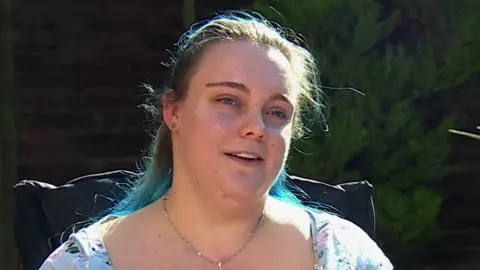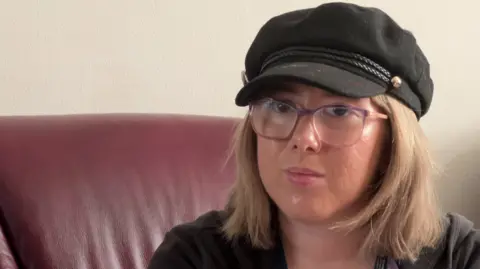 BBC
BBCPlanned cuts to the benefit system could be a matter of life or death for some people, a claimant has said.
The government plans to tighten the eligibility criteria for the Personal Independent Payment (Pip), which is paid to about 3.6m people who have a long-term physical or mental health condition.
Chancellor Rachel Reeves set out her plans for the UK economy during her Spring Statement on Wednesday.
A government spokesperson said all Pip assessments were conducted “rigorously and professionally”.
Assessments for the daily living part of Pip will be tightened, which the Office for Budget Responsibility (OBR) estimates will affect about 800,000 people.
‘Guilty until proved innocent’
Shannon Doulis’ life changed after she contracted Covid-19 four years ago, later developing chronic fatigue syndrome and fibromyalgia as a result of long Covid.
The 28-year-old, who lives in Totton, Hampshire, gets £400 a month in Pip to pay for costs that she has incurred as a result of her illnesses.
“That £400 a month doesn’t sound like much but it’s a lifeline for me. It means when I do have to go out, I can pay for a taxi,” she said.
“We’re treated as if we’re guilty of fraud until we’re proven innocent by being allowed our benefits.
“You can’t just say: we’re not going to pay you, we think you should be working, so [be] better. It doesn’t work like that,” she said.
“I could try [going back to work]. But I know how it’s going to end. That is why I lost my last job – because I wasn’t well enough, I wasn’t reliable enough.
“I would have to work a day and then have two weeks to recover and then maybe work another day. No one is going to employ me on that basis.”


Sophie Brudenall, 24, from Slough, Berkshire, has the eye condition aniridia and has been claiming Pip for her visual impairment and mental health reasons since 2020.
The university student said, during the “very difficult” assessments, it was as if the government was trying “to catch you out”.
“For people with more severe disabilities who are deemed to be not as severe as the government deem they should be [for Pip], it could be life or death,” she says.
“They might not be able to pay for medication; they might not be able to pay for their accessible technology. Technology is not cheap if you’re disabled.”
A Department for Work and Pensions (DWP) spokesperson said: “We support millions of people through our welfare system every year and it is a priority people receive the benefits they are entitled to as quickly as possible.
“All Pip assessments are conducted rigorously and professionally and are independently audited to ensure claimants are receiving the same high-quality service.”





























